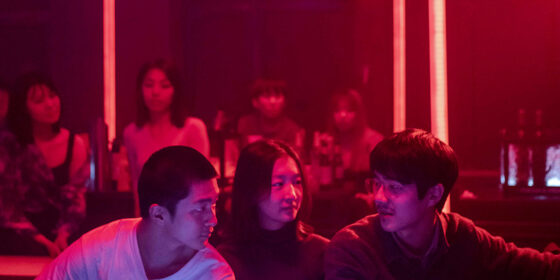TIFF 2023 | The Breaking Ice (Anthony Chen, China) — Centrepiece

By Michael Sicinski.
The less you know about Asian cinema, the more striking you’re liable to find this film. Much like last year’s Return to Seoul, The Breaking Ice is a perfectly solid Un Certain Regard entry, reasonably well-directed and visually quite well-appointed. However, Anthony Chen hews too closely to the “alienated urban youth” template, placing his handsome actors in various scenarios that don’t lend themselves to very much development. The Breaking Ice is as aimless as its characters, whose outer orbital of disaffection keeps them hovering around one another, wandering around and smoking and staring at the dazzling neon lights with more attitude than purpose. In other words, there’s nothing here that hasn’t been assayed much more poignantly years ago by Hou Hsiao-hsien or Jia Zhangke.
Hao Feng (Liu Haoran) is a depressive wanderer from Shanghai, taking time away from his finance job to visit the town of Yanji, in the north of China and smack dab on the border with North Korea. He is in town for a friend’s wedding, but soon slinks away from the festivities. While sightseeing he meets Nana (Zhou Dongyu), an attractive but surly tour guide. During a smoke break, Nana senses that Hao Feng might be a kindred spirit, and so she invites him to hang out with her and her friend-zoned buddy Han Xiao (Qu Chuxiao). They eat, drink, dance, and eventually end up at Nana’s flat where, after a night of drinking capped by an abortive hookup, Hao Feng misses his flight home. So the three spend several days in each other’s company.
Typically, such cinematic encounters imply that lives will be changed forever, but Chen suggests that they all end up pretty much where they began. Early on we learn that Nana was an Olympic-bound ice skater whose career was ended by an injured Achilles’ tendon, and her response was to move away and abandon her previous life. While this backstory provides a reason for Nana’s bitterness, that seems secondary to Chen’s insistent use of ice as a metaphor. The film opens on a frozen lake as workers cut and extract large blocks of ice. Hao Feng sucks on ice cubes when he’s nervous. Han Xiao drives recklessly on icy roads. And towards the end of the film, the three principals wander around in an ice maze, failing to find one another.
At the film’s conclusion, the group drive to the top of Changbai Mountain in the hope of seeing Heaven Lake. Instead, they find some sluggish CGI in the shape of a grizzly bear. It’s implied that this is the emotional climax of the film, but like so much else in The Breaking Ice, this scene offers much less than meets the eye. In fact, the most striking aspect of Chen’s film is the suitably chilly cinematography of Yu Jingping, particularly her playful use of urban lighting. Despite its literary pretentions, The Breaking Ice is an emotionally withholding film, one that asks quite a bit more than it gives back.
Michael Sicinski

